Emerald Ash Borer
- Insect damge: Vascular feeding
- Host Tree: Ash
- Treatment: Trunk Injection
- Price: Average tree is ~ $240.00. 2 years of protection.
Spongy Moth (Formally Gypsy Moth)
- Insect damge: Leaf feeding
- Host Tree: Oak is their favorite, but many others.
- Treatment: Trunk Injection/Foliar Spray
- Price: Average injection is ~ $240.00.
- Average spray starts st $175.00 Multi tree discounts.
Two Lined Chestnut Borer
- Insect damge: Vascular feeding
- Host Tree: Oak
- Treatment: Trunk Injection/Soil treatment
- Price: Average injection is ~ $240.00. 2 years of protection.
- Average soil treatment is $125.00 Multi tree discounts are available.
Japanese Beetles
- Insect damge: Leaf feeding
- Host Trees: Linden, Birch, and Fruit Trees are their favorite, but many others.
- Treatment: Soil treatment/Foliar Spray
- Price: Average soil treatment is $125.00. Multi tree discounts are available.
- Sprays start at $125.00. Multi tree discounts are available.
Bronze Birch Borer
- Insect damge: Vascular feeding
- Host Tree: Birch
- Treatment: Trunk Injection/Soil treatment
- Price: Average injection is ~ $240.00. 2 years of protection.
- Average soil treatment is $125.00. Multi tree discounts are available.
Control and Prevention of Insect Infestation in Trees
Better Services at a Lower Price
Certified Arborist
Emergency Services Available
Hours:
Treatment for Japanese Beetle Infestation
Easily identifiable by their metallic color, the Japanese beetles are most active during their peak feeding time from June to August.
Feeding on various kinds of plants, specifically birch linden (basswood), crabapple, mountain ash, and roses, the Japanese beetles often eat most of the flesh, leaving a mere skeleton of a leaf behind.
Often found in groups, large numbers of concentrated beetles feeding on your tree's leaves can cause defoliation, and the resulting stress can compromise your tree's health and longevity.
Treatment Options
Foliar Spray:
Foliar sprays are an easy way to control the population of Japanese beetles. If you've noticed the effects of Japanese beetles on your tree,
call The Tree Doctors LLC today for effective tree treatment to control live beetles. One application is generally sufficient.
Average Cost: $145.00 per application.
Basal Drench: Used preemptively against Japanese beetles, basal drench treatment is a preventive treatment that involves systematic insecticide treatment at the base of your tree and will be completed in early spring.
The tree's roots will uptake the insecticide into the crown of the tree, and the insects that feed on the leaf tissue come in contact with the insecticide and die. This treatment also helps in controlling other harmful insects such as bronze birch borers, birch leaf miners, and emerald ash borers. One treatment lasts twelve months.
Average Cost: $125.00 per annual application.
For more information on Japanese Beetle click
HERE
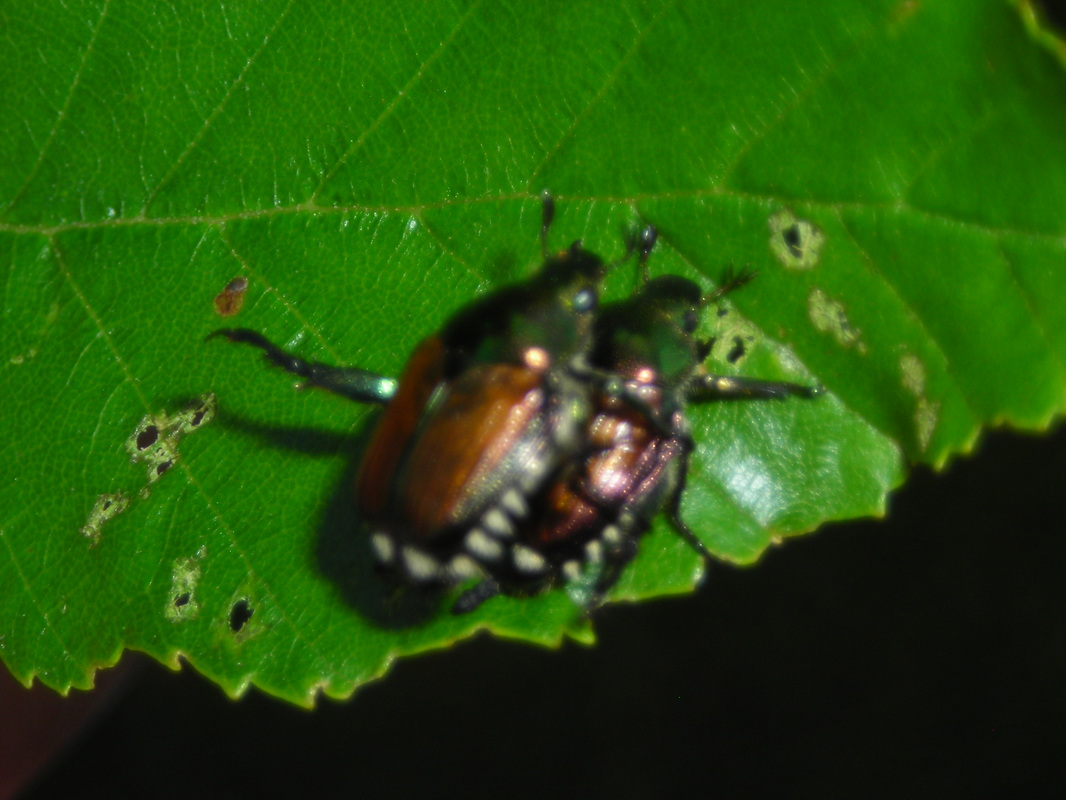
Jananese beetles are commonly found in pairs
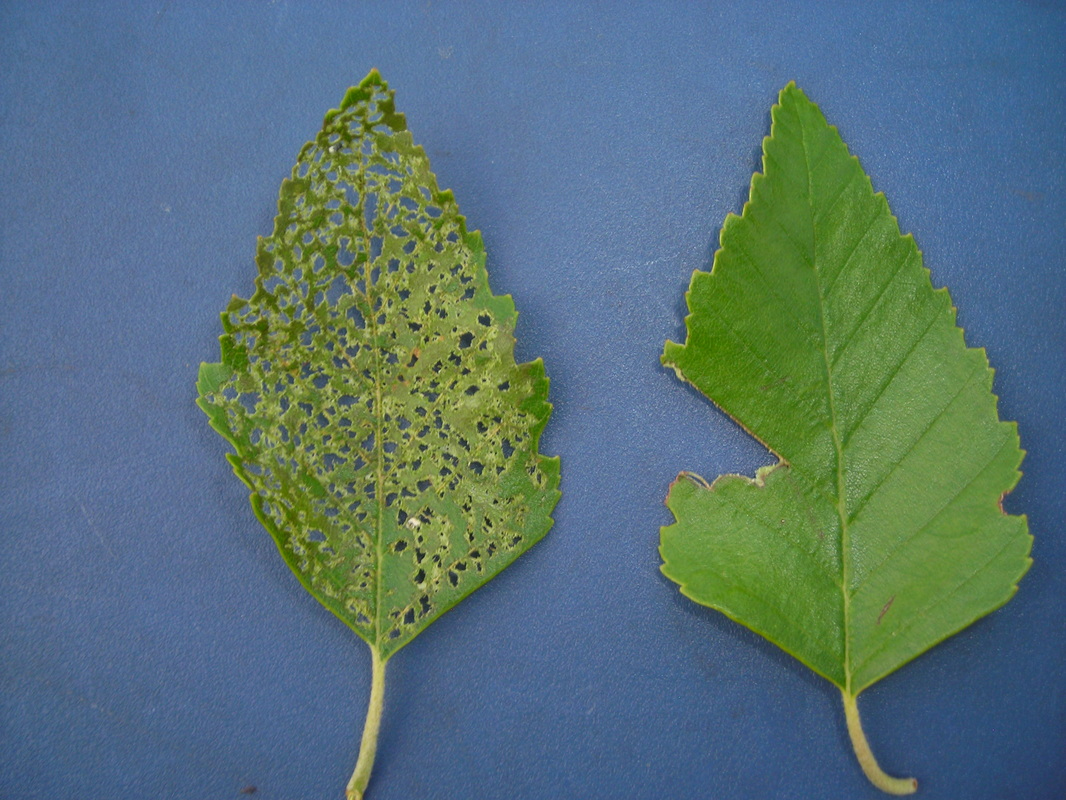
Defoliation caused by Japanese Beetle
Treatment for Emerald Ash Borer (E.A.B.)
The Emerald Ash Borer (EAB) is a member of the wood borer family and is closely related to the bronze birch borer and the tow-lined chestnut borer. These invasive species have terribly affected the native ash population.
EAB invades the ash trees by chewing through the bark and eventually feeding on the vascular tissue. This disrupts the active transportation of necessary nutrients throughout the tree, resulting in the thinning of the crown and the smaller branches beginning to die.
The earliest sign of EAB is generally woodpeckers present on the tree removing the loose bark and preying on these insects. If you've observed signs of the Emerald Ash Borer invasion, call us today.
Treatment Options:
Basal Drench: Used preemptively against emerald ash borers, basal drench treatment is a preventive treatment that involves systematic insecticide treatment at the base of your tree and will be completed in early spring.
The tree's roots will uptake the insecticide into the crown of the tree, and the insects that feed on the leaf tissue come in contact with the insecticide and die. This treatment also helps in controlling other harmful insects such as bronze birch borers, birch leaf miners, and Japanese beetles. One treatment lasts twelve months.
Average Cost: $125.00 per annual application.
Direct Inject: This is a preventive treatment that is also effective in treating infestations detected at an early stage. The treatment involves injecting chemicals directly into the tree's vascular tissue.
The advantage of this treatment over the basal drench treatment is the rapid uptake into the crown of the tree within hours, unlike the basal drench treatment, which takes weeks. This treatment lasts two years.
Average Cost: $200 per biannual application.
For more information on Emerald Ash Borer click HERE
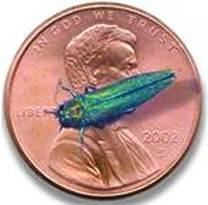
Emerald Ash Borer on a penny.
Emerald Ash Borer Update -
Infested Counties
When: Right now. EAB is spreading through Southern WI very quickly.
Where: Southen and Western WI have many confirmed trees that are infested.
How: These insects are hitching rides with cars, trains, and anything they can hang onto. The insects do not fly long distances so humans are the primary movers of the insects.
What: Ash trees will either need to be removed or treated. Insecticides have proven highly effective when properly used and administered.
Treatment for Bronze Birch Borer Infestation
Number one killer of birch trees in Wisconsin, the bronze birch borer is a member of the wood borer family and closely related to the emerald ash borer and two-lined chestnut borer. These insects invade the ash trees by chewing through the bark and eventually feeding on the vascular tissue.
This disrupts the active transportation of necessary nutrients throughout the tree, resulting in the dying of branches on the tops of trees. The bronze birch borer is not as aggressive as EAB. Unlike EAB, it tends to attack already stressed or weak trees.
Unfortunately, birch trees are often stressed from being planted outside of their natural habitat for landscaping purposes. Birch trees prefer moist soil and shaded roots, and regular watering is recommended to avoid stress due to drought.
Treatment Options:
Basal Drench: Used preemptively against bronze birch borers, basal drench treatment is a preventive treatment that involves systematic insecticide treatment at the base of your tree and will be completed in early spring.
The tree's roots will uptake the insecticide into the crown of the tree, and the insects that feed on the leaf tissue come in contact with the insecticide and die. This treatment also helps in controlling other harmful insects such as Japanese beetles, birch leaf miners, and emerald ash borers. One treatment lasts twelve months.
Average Cost: $125.00 per annual application.
Direct Inject: This is a preventive treatment that is also effective in treating infestations detected at an early stage. The treatment involves injecting chemicals directly into the tree's vascular tissue.
The advantage of this treatment over the basal drench treatment is the rapid uptake into the crown of the tree within hours, unlike the basal drench treatment, which takes weeks. This treatment lasts two years.
Average Cost: $200 per biannual application.
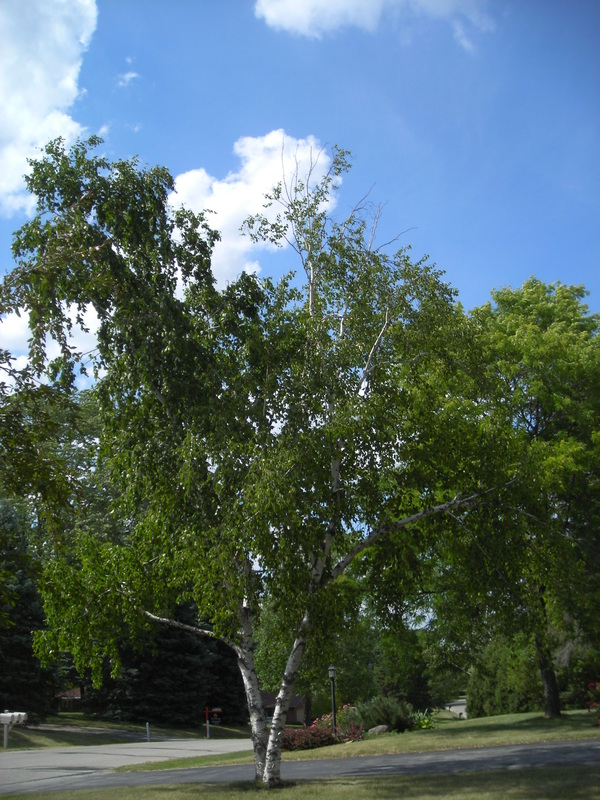
Birch tree infested with Bronze Birch Borer
Effective Defense Against Insect Intruders
Call us today for your free diagnosis.
(920) 285-3433
serving Area
35 mile radius around Jefferson, WI
Jefferson, WI
Watertown, WI
Business Hours
- Mon - Fri
- -
- Sat - Sun
- Closed
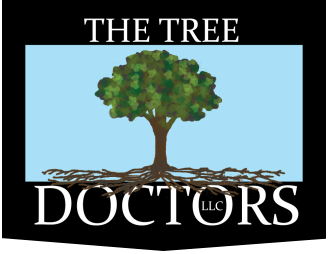

Share On: